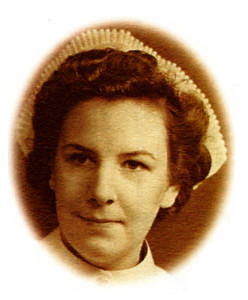
I was eight years old when my mother died, leaving my father with four children. For this reason I was sent to boarding school. At 18, I went into nursing to make life easier at home. It didn’t make it easier for me! It was a very hard life, but I loved it. Nursing was considered to be a vocation, and nobody went into it for the money. I received only £18 for my first year’s pay, although food and accommodation were provided.
Because my father was concerned that I might be unhappy, I started my career in a cottage hospital close to my home. I still remember the shame of being late on duty on the first morning because I hand’t allowed enough time to get dressed. It took forever, with the complicated cap with wings covering every scrap of hair, and the innumerable studs.
Upon reporting to Sister I was shown to my locker, which contained a long cobweb brush, a radiator brush, a bed brush for sweeping mattresses, dusters and polish.
These had to be shown every morning before being allowed on the ward. In addition we had to have a bowl of carbolic for wiping lockers.
Ward maids cleaned the floors and did the washing-up.
Three minutes were allowed for making each bed.
This was done by two nurses, everything being folded in three over a chair. When Matron did her round it was imperative that all castors were turned in and that the patient was lying in a tidy position, arms straight and legs parallel.
Blankets were made into small packages and hot water botdes filled for the arrival of a new patient, and heaven help anyone who had not carbolised the metal bed.
We helped to serve meals and feed patients where necessary, and always made a beeline for left-overs in the ward kitchen. For eight years I ate rice pudding every day.
As training progressed, we helped to give injections and dress wounds.
The atmosphere was more relaxed on night duty. We had to boil bandages for re-use and make gauze swabs for the theatre. Patients would make cotton wool into balls. We even had to stoke the boiler and burn ‘nasties’ from operations – and all this in our white aprons. We also had to cook the dinner on a gas stove. One Sister was very strict, and would not let us use the word “tummy’. “Stomach,” she said. “There is no such part as tummy!”
We had to take a specimen of urine from each new patient, and one nurse, when told to clean the bedpans with soda water, got out a soda syphon and squirted the lot!
I was very happy in this hospital, but eventually moved on to do my fever training and nursed outbreaks of meningitis and typhoid. The measles ward overlooked the cemetery, and the children were disappointed if there wasn’t a funeral, as that was their entertainment.
It was wartime and we had little food, so when off duty I and another friend helped out at a Salvation Army hostel, having nursed the Captain’s child. For this we were rewarded with a welcome sandwich and a cup of Horlicks. Another of these hostels nearby did farthing breakfasts for the very poor.
Where I live now, we have a wonderful new hospital, but I’m glad I experienced life before it was all machine-operated,
Christine Bress








